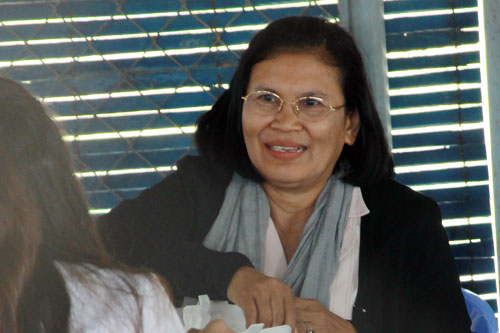

It took So Socheat a long time to get to know Khmer Rouge tribunal defendant Khieu Samphan, her husband.
Attracted to the Khmer Rouge after the civil war put a halt to farming in her Preah Vihear home, Socheat was by late 1971 cooking for top leaders of the future regime, she told the tribunal yesterday. She knew Khieu Samphan only as Brother Hem.
“At that time we did not get to know one another immediately.”
After three or four months as a cook at the Khmer Rouge’s jungle base, Socheat learned from a female cadre that Brother Hem wanted to marry her and asked whether she would accept.
“I asked her to give me some time to think about this, because I had just gotten to the place and just gotten to know him,” Socheat, 62, said.
Over the next half year, “every now and then he would come to the kitchen, and sometimes he even offered to help me with the kitchen work. Sometimes I asked him to sort the bean sprouts,” she said, very faintly smiling.
“I learned that he was an intellectual, educated person, and gentle,” she said. “So I finally decided to tie the knot, and then we married.”
At the time of the wedding – a low-key affair without traditional music or Buddhist prayers – Socheat still did not know Samphan’s name, nor his role in the resistance movement of which she was a part.
“People joked at me because I did not even know my husband’s real name.”
She learned his name – one she had never heard before – a few months later, when Samphan and others received Prince Norodom Sihanouk on his visit to the country.
Life at that time was very hard because the leaders had to move locations every month to avoid discovery, Socheat said. Meanwhile, she gave birth to her first son and was happy that her busy husband took time to help care for the child.
But she remained in the dark about his work, not only before but also after the Khmer Rouge’s victory in 1975.
Under the regime, Socheat said, she continued as a cook for the administration, and the family lived in a poor quality house with no bed.
Every day Samphan “would cuddle my little daughter, and after, he went down to his workplace, and that was his daily routine, and he never missed it.”
“I did not go to his workplace, and at that time I did not know the nature of his work. But my daughter went with him frequently.”
The daughter, a toddler at the time, would return from Samphan’s office mimicking her father speaking on the phone.
“She said, ‘No, no, no,’ and I asked her what she was talking about.”
A while later, Socheat learned her daughter had been observing Samphan in his role as a key administrator of goods distribution. But Socheat stressed that her husband, with whom she has four children, led a very unprivileged life, and their three-year-old son was sent to join the Khmer Rouge children’s unit.
“We did not want our children to go there, but it was compulsory . . . We had no choice.”
“Even while other leaders had good cars, nice houses, my husband never enjoyed that kind of life,” Socheat said. “He’s not a cruel person. He’s not a murderer. He’s not the person who went around making arrests.”
Contact PhnomPenh Post for full article
SR Digital Media Co., Ltd.'#41, Street 228, Sangkat Boeung Raing, Khan Daun Penh, Phnom Penh, Cambodia
Tel: +855 92 555 741
Email: [email protected]
Copyright © All rights reserved, The Phnom Penh Post




